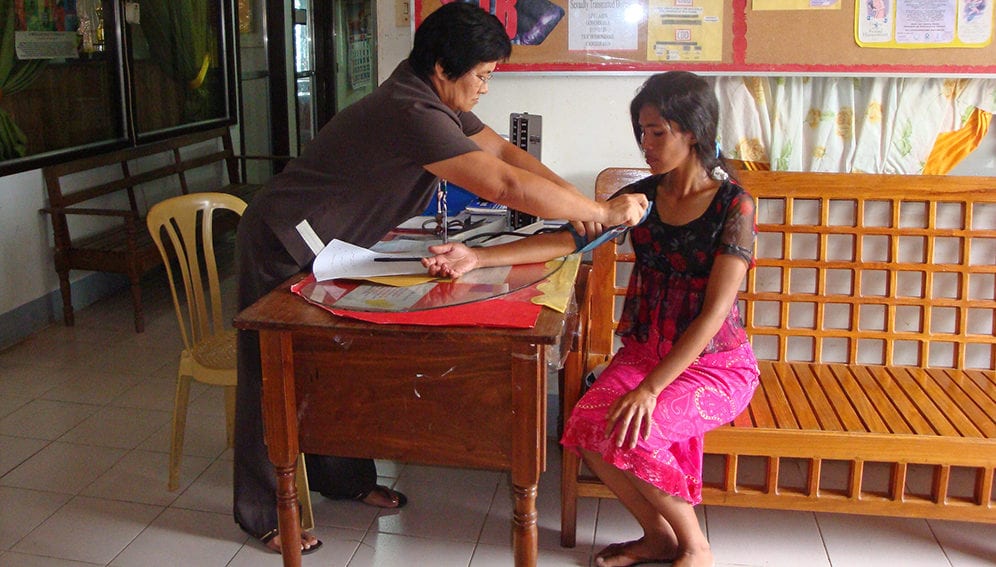11/12/19
How to fund health cover for all by 2030?

By: Crispin Maslog
Send to a friend
The details you provide on this page will not be used to send unsolicited email, and will not be sold to a 3rd party. See privacy policy.
The UN General Assembly in a bold — and perhaps brash and ambitious move — adopted two months ago (10 October) a political declaration on universal health coverage by 2030.
The declaration was made following a high-level UN meeting on 23 September 2019 to accelerate progress towards universal health coverage including financial risk protection, access to quality health services, affordable medicines and vaccination for all. The UN must now move resolutely in one decade to build a healthier world as a precondition for the implementation of the UN 2030 Agenda for Sustainable Development. (1)
UN Secretary General António Guterres described the move as an “important landmark” on our “journey to health for all”, saying the political declaration on universal health coverage, or UHC, commits countries to advance towards full coverage for their citizens, and called the UHC “the most comprehensive agreement ever reached on global health”. (2)
“Universal health care is an ambitious concept and programme. Is it feasible and who will finance it?”
Crispin Maslog
General Assembly president Tijjani Muhammad-Bande stressed that access to critical health services “must be a universal right and not a privilege”. (2)
“We must do our utmost best to ensure that nations around the world can benefit from each other in medical training, provision of medical infrastructures, among others, if we are to achieve our agreed SDGs (Sustainable Development Goals)," he stated.
Funding universal health care
Universal health care is an ambitious concept and programme. Is it feasible and who will finance it?
That might be the conundrum facing the UN. In most cases, especially in the many poor countries, the scheme will be financed by governments. Citizens will be enrolled in government health programmes by virtue of citizenship, and governments will allocate funds from local and national government budgets. (3)
In the few rich and developed countries there will be a variety of private financing schemes — whether by compulsory health insurance schemes (through public or private entities) linked to the payment of social contributions or health insurance premiums.
In most cases there will be a varying proportion of health care spending from households’ out-of-pocket payments – either as standalone payments or as part of co-payment arrangements. There will also be various forms of voluntary payment schemes like voluntary health insurance.
Most likely the UN will study and adopt the best practices of the 32 developed countries now implementing various forms of universal health care, most of them from Europe. (4)
Developed countries with universal health care
These 32 countries have universal health care. They adopt one of the following three models.
1. Single tax payer system. Under this system, 12 of 32 governments, like the UK, tax their citizens to pay for health care. Services are government-owned and service providers are government employees. Other countries use a combination of government and private service providers.
2. Insurance system. Six countries enforce an insurance mandate. Everyone buys insurance, either through their employer or the government. Germany is the best example of this system.
3. The others use a two-tier approach. The government taxes its citizens to pay for basic government health services. Citizens can also opt for alternative services supplemented by private insurance. France is the best example.
The US is a special case which one might describe as a hybrid. Although majority of Americans support the idea of universal health care, US health care is not as inclusive as in France, Germany, Singapore, Switzerland and the UK. Obamacare is the closest to universality the US has ever implemented, but it has too many exemptions.
UHC for 161 other countries?
There are 163 member-states not yet covered by UHC, including two countries that are classified as observer states: the Holy See and the State of Palestine.
Will the UN Universal Health Care programme also cover them? Eventually yes, but when and how soon? Just to contemplate the size and the source of funding for such a gargantuan project is mind boggling, to say the least.
The UN declaration recognises that the world spends US$7.5 trillion on health, which is close to 10 per cent of global gross domestic product. However, the budget for health from public and external funds is small and out of proportion to other expenses.
On average, one-third of national health spending comes from out-of-pocket expenses, and less than 40 per cent of the budget for primary health care in poor countries is from public sources. External funding represents less than 1 per cent of global health expenses and low-income countries still rely on aid, which accounts for about 30 per cent of national health spending.
The budgets for UHC could be covered by local and national government budgets if not for corruption, and the UN knows this. It “recognises that fighting corruption is a priority because it is a serious barrier to effective resource mobilisation and . . . may undermine efforts to achieve universal health coverage”.
The road to successful implementation of universal health coverage is indeed littered with obstacles, foremost of which is funding.
I also revert to one of my pet peeves with governments in developing countries and the UN — the refusal to tackle population head-on as one of the main issues of development. Our planet can hold only so many people and is spilling to over 7.7 billion people in 2019.
While there is a reference to family planning in this UHC declaration, it is not strong enough. We hope at the next high-level UN conference on UHC in New York in 2023 this issue will be tackled.
The International Universal Health Coverage Day celebration today (12 December) reminds us that the goal of UHC for all is a shared commitment that begins with the belief that it can be done and must be done as part of basic human right.
Crispin C. Maslog, former journalist with Agence France-Presse, is an environmental activist and former science journalism professor, Silliman University and University of the Philippines Los Baños, Philippines. He is a founding member and now Chair of the Board, Asian Media Information and Communication Centre, Manila.
This piece was produced by SciDev.Net’s Asia & Pacific desk.
*This article was updated on 13 December 2019.
References
- Resolution adopted by the General Assembly on 10 October 2019 [without reference to a Main Committee (A/74/L.4)] 74/2.
- UN News Release, 10 October 2019
- Health at a Glance: Asia/Pacific 2018, Measuring Progress towards Universal Health Coverage
- Universal Health Care in Different Countries, Pros and Cons of Each. The Balance 2019













